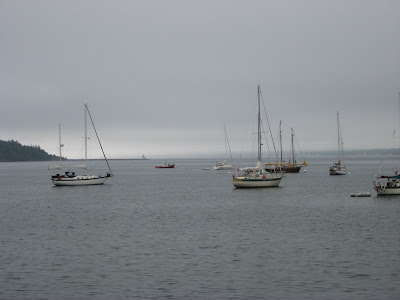On Friday we took our time getting up and on the road again
as Lunenburg, our next stop, was only about 80 miles away.
We got here about noon and got set up – beautiful site here
along a small lake.
We
needed some groceries so we found the local Walmart store and got most of what
we needed.
Check out their specialty meats:We had marshmallows and graham crackers but no Hershey chocolate bars. Guess what – they don’t carry them!! Only the bars with almonds.
We went to another store (grocery) and they didn’t have them
either. I talked with one of the clerks
and she didn’t even know what I was talking about! We texted Julie to tell her about our problem
and she responded that it just happens to be “National Smores Day!” Fortunately, we did have one candy bar left
so later we did celebrate the day.
Lunenburg is another quaint fishing town. It was established in 1753 as the first British Colonial settlement in Nova Scotia outside of Halifax. These early settlers were from various parts of Germany, Switzerland, and the Montbeliard region of France. They followed in the footsteps of earlier Mikmaq and Acadian inhabitants in the area. A vibrant and stable economy was built on farming, fishing, ship buildings and ocean-based commerce, particularly in the West Indies trade. More than 200 years in fishing, ship-building and marine related industries has provided Lunenburg with a strong economic base.
They also had a great museum here. You could actually go aboard several of the boats at the dock.
Bluenose was launched at Lunenburg, Nova Scotia on March 26, 1921 and built to be a racing ship and fishing vessel, in response to the defeat of the Nova Scotian Fishing Schooner Delawana by theGloucester, Massachusettsfishing schooner Esperantoin 1920, in a race sponsored by the Halifax Herald newspaper.
After a season fishing on the Grand Banks of Newfoundland,Bluenose defeated Elsie (out of Gloucester), returning theInternational Fishermen's Trophy to Nova Scotia. In 1930, off Gloucester, Massachusetts, she was defeated 2–0 in the inaugural Sir Thomas Lipton International Fishing Challenge Cup by perhaps her most celebrated competitor, the Gertrude L. Thebaud.[2] However, over the next 17 years of racing, no challenger, American or Canadian, could wrest the International Fishermen's Trophy from her.
She was no mere racing ship, but also a general fishing craft that was worked hard throughout her lifetime. She fished cod and other kinds of groundfish, and at least once won competitions for largest catches of the season and similar awards.
Dories, again.
It was an overcast day the day we were there, but we did go across the bay and get pictures of the wharf and town.
This was a section of a golf course along the bay.
And this was a neat-looking church in a town a little past Lunenburg.
Next stop Halifax.


















No comments:
Post a Comment